Today Current Affairs: 26th May 2021 for UPSC IAS exams, State PSC exams, SSC CGL, State SSC, RRB, Railways, Banking Exam & IBPS, etc
Table of Contents
Miniature sculpture of the Buddha found in Udupi:
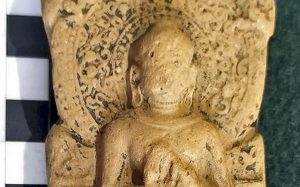
The Buddha was found among debris removed from an abandoned well at Alembi in Udupi district in Karnataka.Traditionally, the ancient Tulu Nadu was said to be ruled by the Kadambas of Banavasi. The Guptas and the Kadambas of Banavasi had matrimonial relations. Hence, the discovery of the Buddha sculpture is not an uncommon thing.
- It is nine centimetres high, five centimetres wide and two centimetres thick.
- The Buddha is seated on a lotus pedestal in Dharma Chakra Pravarthana Mudre.
- Below the seat, six disciples are seated on either side of the Dharma Chakra.
- The Lord wears clothes and ear-rings.
- A small Ushnisha is shown on the top of the head.
- In the back of the head, a beautifully carved round lobe is seen.
- On the top corners, two Yakshas and, on either side of his back, two winged horses have been carved out.
- The sculpture is in the Gupta style.
Guidelines for Intermediaries and Digital Media Ethics Code Rules, 2021:

New IT rules to regulate digital content, featuring a code of ethics and a three-tier grievance redressal framework, have come into force (May 26).
- On February 25, the Centre framed the Information Technology (Intermediary Guidelines and Digital Media Ethics Code) Rules 2021, in the exercise of powers under section 87 (2) of the Information Technology Act, 2000 and in supersession of the earlier Information Technology (Intermediary Guidelines) Rules 2011, which will come into effect from May 26.
The new rules:
- It mandates a grievance redressal system for over the top (OTT) and digital portals in the country.
- This is necessary for the users of social media to raise their grievances against the misuse of social media.
- Significant social media firms have to appoint a chief compliance officer and have a nodal contact person who can be in touch with law enforcement agencies 24/7.
- Social media platforms will also have to name a grievance officer who shall register the grievance within 24 hours and dispose of it in 15 days.
- If there are complaints against the dignity of users, particularly women – about exposed private parts of individuals or nudity or sexual act or impersonation etc – social media platforms will be required to remove that within 24 hours after a complaint is made.
- They also will have to publish a monthly report about the number of complaints received and the status of redressal.
- There will be three levels of regulation for news publishers — self-regulation, a self-regulatory body, headed by a retired judge or an eminent person, and oversight from the Information and Broadcasting Ministry, including codes of practices and a grievance committee.
Mercury Was Found In The Water Bodies Fed By The Greenland Ice Sheet.:
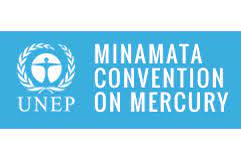
According to recent research, high concentrations of mercury were found in the water bodies fed by the Greenland Ice Sheet.
- Typical dissolved mercury content in rivers is about 1 – 10 ng L-1 .
- In the water bodies fed by the Greenland Ice Sheet, scientists found dissolved mercury levels in excess of 150 ng L-1, far higher than an average river.
- It is not the industries or other anthropogenic activities, as is the case with most contaminants.
- Mercury-rich bedrock is weathered during the slow movement of glaciers down the slope of hills and the ground particles are carried into the streams as the glacier melts.
- Mercury is a naturally occurring element that is found in air, water, and soil. Released into the atmosphere through natural processes such as weathering of rocks, volcanic eruptions, geothermal activities, forest fires, etc.
- Mercury is also released through human activities.
- Mercury may have toxic effects on the nervous, digestive, and immune systems, and on lungs, kidneys, skin, and eyes.
- Chemicals of major public health concern- Mercury is considered by the World Health Organisation (WHO) as one of the top ten chemicals or groups of chemicals of major public health concern.
- Minamata Disease: A disorder caused by methylmercury poisoning that was first described in the inhabitants of Minamata Bay, Japan, and resulted from their eating fish contaminated with mercury industrial waste.
Minamata Convention:
- The Minamata Convention on Mercury is a global treaty to protect human health and the environment from the adverse effects of mercury and its compounds.
- It was agreed at the fifth session of the Intergovernmental Negotiating Committee in Geneva, Switzerland 2013. It entered into force in 2017.
- Controlling the anthropogenic releases of mercury throughout its lifecycle is one of the key obligations under the Convention.
- It is a UN treaty.
- The Convention also addresses interim storage of mercury and its disposal once it becomes waste, sites contaminated by mercury as well as health issues.
- India has ratified the Convention.
WHO BioHub Initiative:
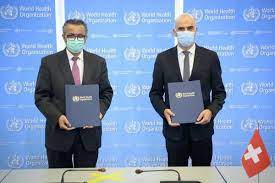
The World Health Organization (WHO) and Switzerland have launched a BioHub facility that will allow pathogens sharing between laboratories and facilitate “analysis and preparedness” against them.
- The facility will help in the safe reception, sequencing, storage and preparation of biological materials for distribution to other laboratories, so as to facilitate global preparedness against these pathogens.
- It will enable member states to share biological materials with and via the BioHub under pre-agreed conditions, including biosafety, biosecurity, and other applicable regulations.
- In parallel, WHO will broaden its BioHub System for the use of biological materials by qualified entities – such as manufacturers – for the development of medical by-products for fair allocation to countries.
- The Covid-19 pandemic and other outbreaks and epidemics have underscored the importance of rapidly sharing pathogens to help the global scientific community assess the risk and develop countermeasures such as diagnostics, therapeutics, and vaccines.
- Pathogens have been shared bilaterally between countries: A process that can be sluggish and deny the benefits to some.
- This will ensure the timely sharing of epidemiological and clinical data as well as biological materials.
- The move will help contribute to the establishment of an international exchange system for novel coronavirus SARS-CoV-2 and other emerging pathogens
Vesak Celebration:
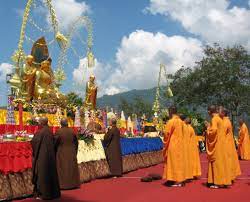
The Prime Minister addressed “Virtual Vesak Global Celebrations” on Buddha Purnima.
- The event is being organized by the Ministry of Culture in collaboration with the International Buddhist Confederation (IBC) and will witness the participation of all the supreme heads of the Buddhist Sanghas from around the world.
Buddha Purnima:
- It is celebrated to mark the birth of Gautam Buddha, the founder of Buddhism.
- It is also known as Vesak. In 1999, it became an UN-designated day, to acknowledge the contribution of Buddhism to society.
- It is considered a ‘triple-blessed day’ – as Tathagata Gautam Buddha’s birth, enlightenment, and Maha Parnirvana.
- Buddha Purnima falls on a full moon night, usually between April and May, and it is a gazetted holiday in India.
- Many devotees visit Mahabodhi Temple, a UNESCO World Heritage Site, located in Bodh Gaya, Bihar, on this occasion.
- Bodhi Temple is the location where Lord Buddha is said to have attained enlightenment.
- International Buddhist Confederation (IBC) is the biggest religious Buddhist confederation.
- The purpose of this body is to create a role for Buddhism on the global stage so as to help to preserve heritage, share knowledge, and promote values, and represent a united front for Buddhism to enjoy meaningful participation in the global discourse.
- In November 2011, New Delhi was host to the Global Buddhist Congregation (GBC), where the attendees unanimously adopted a resolution to form an international umbrella body – the International Buddhist Confederation (IBC).
- HQ: Delhi, India.
One-Stop Centres:

The Ministry of Women and Child Development will set up One Stop Centres (OSCs) across 10 countries to provide assistance to Indian women who are survivors of gender-based violence.
- The missions where the OSCs will come up are Bahrain, Kuwait, Qatar, Oman, UAE, Jeddah and Riyadh in Saudi Arabia, Australia, Canada and Singapore.
- It will also set up 300 OSCs in the country in addition to the nearly 700 existing ones across all districts.
- It is a centrally sponsored scheme for addressing the problem of violence against women. It was launched in April 2015.
- It is a subscheme of the umbrella scheme for the National Mission for Empowerment of Women including Indira Gandhi Mattritav Sahyaog Yojana.
- The one-stop centre will be established across the country and at least one OSC in every mission around the world to provide integrated support and assistance under one roof to women affected by violence.
- Indian missions represent an important form of contact between the Indians around the world and the government of India.
- Objectives:
- To support women affected by the violence that they may face within the family or at the workplace or within the community, in private or public places.
- Especially for women who face sexual, physical, psychological, emotional and economic abuse, irrespective of their caste, creed, race, class, education status, age, culture, or marital status.
- It is funded through Nirbhaya Fund and the central government provides 100% financial assistance to the state governments /Union Territories administrations.
Subodh Kumar Jaiswal: New Director Of The CBI:
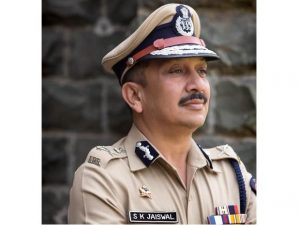
The Central Government has appointed ‘Subodh Kumar Jaiswal’ as a new Director of the Central Bureau of Investigation (CBI).
- The Director of the CBI is appointed as per section 4A of the Delhi Special Police Establishment Act of 1946.
- The CBI was set up in 1963 by a resolution of the Ministry of Home Affairs.
- Now, the CBI comes under the administrative control of the Department of Personnel and Training (DoPT) of the Ministry of Personnel, Public Grievances and Pensions.
- The establishment of the CBI was recommended by the Santhanam Committee on Prevention of Corruption (1962–1964).
- The CBI is not a statutory body. It derives its powers from the Delhi Special Police Establishment Act, 1946.
- The CBI is the main investigating agency of the Central Government.
- It also provides assistance to the Central Vigilance Commission and Lokpal.
- It is also the nodal police agency in India that coordinates investigations on behalf of Interpol Member countries.
- The CBI is headed by a Director.
- The CBI has jurisdiction to investigate offenses pertaining to 69 Central laws, 18 State Acts and 231 offenses in the IPC.
- Appointment of CBI Director:
- The Director of CBI as Inspector General of Police, Delhi Special Police Establishment, is responsible for the administration of the organization.
- The Lokpal and Lokayuktas Act (2013) amended the Delhi Special Police Establishment Act (1946) and made the following changes with respect to the appointment of the Director of CBI:
- Appointment Committee: The Central Government shall appoint the Director of CBI on the recommendation of a three-member committee consisting of the Prime Minister as Chairperson, the Leader of Opposition in the Lok Sabha, and the Chief Justice of India or Judge of the Supreme Court (SC) nominated by him.
- Tenure of Director: The Director of CBI has been provided security of two-year tenure in office by the CVC Act, 2003.
Supermoon:
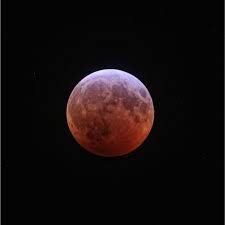
The Moon will have the nearest approach to Earth on May 26, and therefore will appear to be the closest and largest Full Moon or “supermoon” of 2021. This celestial event coincides with this year’s only total lunar eclipse, the first since January 2019.
- Significantly, a supermoon and a total lunar eclipse have not occurred together in nearly six years.
- A supermoon occurs when the Moon’s orbit is closest to the Earth at the same time that the Moon is full.
- As the Moon orbits the Earth, there is a point of time when the distance between the two is the least (called the perigee when the average distance is about 360,000 km from the Earth) and a point of time when the distance is the most (called the apogee when the distance is about 405,000 km from the Earth).
- Now, when a full moon appears at the point when the distance between the Earth and the Moon is the least, not only does it appear to be brighter but it is also larger than a regular full moon.
- According to NASA, the term supermoon was coined by astrologer Richard Nolle in 1979.
- In a typical year, there may be two to four full supermoons and two to four new supermoons in a row.
Institute Of Cost Accountants Of India (ICoAl) And Institute Of Company Secretaries Of India (ICSI):

The Union Cabinet has granted ex-post facto approval to the MoUs entered into by the Institute of Cost Accountants of India (ICoAl) and Institute of Company Secretaries of India (ICSI) with various Foreign Countries/Organisations.
- The Institute of Cost Accountants of India (ICoAl) was established by a Special Act of Parliament, namely, the Cost and Works Accountants Act, 1959 as a statutory professional body for the regulation of the profession of Cost Accountancy.
- It is the only recognized statutory professional organization and licensing body in India specializing exclusively in Cost Accountancy.
- Institute of Company Secretaries of India (ICSI) is a statutory body established by an Act of Parliament of India, i.e. The Company Secretaries Act, 1980, to develop and regulate the profession of Company Secretaries in India.
Hate speech : The IPC:
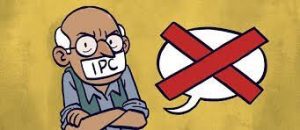
A panel constituted by the Union Home Ministry to suggest reforms to the British-era Indian Penal Code (IPC) is likely to propose a separate Section on “offenses relating to speech and expression.”
- As there is no clear definition of what constitutes a “hate speech” in the IPC, the Committee for Reforms in Criminal Laws is attempting for the first time to define such speech.
- The committee is expected to submit its report soon. The suggestions received by the Committee for Reforms in Criminal Laws will be examined by the Ministry before the changes are adopted.
- Bureau’s definition: The Bureau of Police Research and Development recently published a manual for investigating agencies on cyber harassment cases that defined hate speech as a “language that denigrates, insults, threatens or targets an individual based on their identity and other traits (such as sexual orientation or disability or religion, etc.).”
- Earlier in 2018, the Home Ministry had written to the Law Commission to prepare a distinct law for online “hate speech” acting on a report by a committee headed by former Lok Sabha Secretary General T.K. Viswanathan recommended stricter laws.
- The committee was formed in the wake of Section 66A of the Information Technology Act, 2000, which provided punishment for sending offensive messages through communication services being scrapped by the Supreme Court in 2015.




